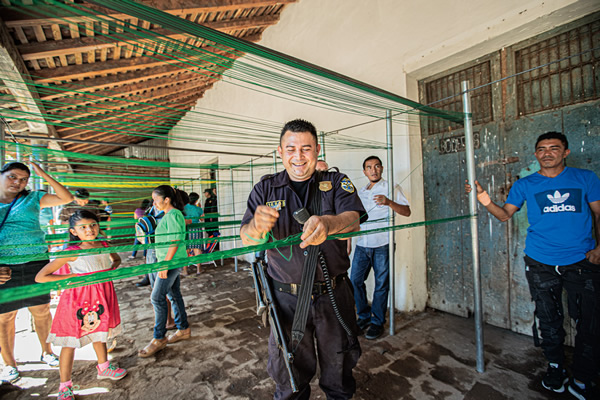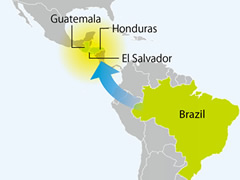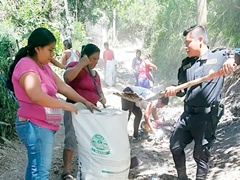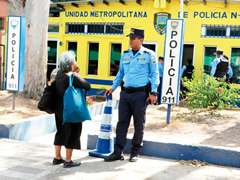Feature
Ensuring Basic Human Rights
Protecting People's Livelihoods based on Trust between Citizens and Police
Police and Locals Working Together to Create Safe and Secure Communities
(Modeled After Japanese-Style Community Policing!)
People need safety and security to enjoy a peaceful and prosperous life. JICA is working with Brazil through triangular cooperation [1] to introduce and promote community policing in the Central American countries of El Salvador, Honduras, and Guatemala.

Officer Arriaza teaching the locals how to make a hammock. Teaching them skills and enabling them to earn an income helps prevent young people from turning to crime.
Learning Japanese-style Community Policing from Brazil
El Salvador, Honduras, and Guatemala form a group of countries called the Northern Triangle of Central America, an area with one of the lowest levels of public safety in the world. Underlying this condition is not only poverty, but also a high level of gang activity.
Such a state of affairs once prevailed in Brazil. However, the situation changed after 1997, when the state of São Paulo introduced community policing modeled after the Japanese "Koban" system of neighborhood police boxes. Since 2000, JICA, together with the National Police Agency of Japan and Japanese prefectural police departments, has supported police activities in the state by dispatching experts to São Paulo and by conducting training in Japan. Thanks to the spread of community policing, the crime rate in Brazil has fallen, and the Koban system of community policing has spread from São Paulo to the rest of the country.
Today, the Police of São Paulo State are putting their experience to work by partnering with JICA to introduce and promote community policing in El Salvador, Honduras, and Guatemala. In El Salvador, the National Civil Police (PNC) has been receiving such support to establish community policing since 2008.
Emphasis on Crime Prevention over the Detection to Crime
In recent years, even as the PNC strengthens its community policing activities, juvenile gangs have become more powerful and organized crime has run rampant, affecting neighborhoods and families. "At the PNC, we have focused on detecting crime. However, to maximise community policing's potential, further crime prevention efforts are also important to fundamentally improve safety and security," explains Olivares Rivera, Community Police Department Chief. The PNC requested JICA's assistance in establishing an advanced policing model to prevent crime by solving community problems together with residents. The project started in 2015.
Today, the PNC prepares and distributes manuals on community policing, trains and dispatches instructors to oversee community policing activities, and works to strengthen community policing activities throughout the country. Community policing has officially become part of the curriculum at the Police Academy, and all new police officers are well versed in its theory and practice. "Sometimes you can't just apply a theory that you learn. We are trying to look at each community individually, share successful cases among officers, and apply what we learn in similar situations to improve our execution," says Rivera.
To strengthen its presence in the community, the PNC is improving its officers' working conditions. The organization has maintained or refurbished 32 police boxes throughout the country allowing residents to interact more freely with police.
Actively Participating in Community Activities
In El Salvador, community policing projects have brought about positive changes to the community in a number of regions. One of these is the municipality of Chapeltique in San Miguel, formerly one of the top 10 cities in the country in terms of crime, and here a unique hammock project is being conducted in the village of Hualamá. The villagers learned to make hammocks from Officer Mario Arriaza; "I taught 40 people how to make them last year, and they are now selling them. Many more people involved this year, and we're providing support so that they can become economically independent," he says. Learning to make hammocks gives them a skill, and that enables them to earn money and have a stable life, which helps to keep them out of crime.
Officer Marta Garcia, who conducts an educational program to prevent youth misconduct, learned a lot at her training in Brazil. "I was amazed to learn that officers were strengthening their connections to the community by publicizing their phone numbers and doing group chats with community leaders.
After returning home and putting these things into practice, I've started to get calls from locals about information related to crimes that may have been committed," she says.
Building Relationships of Trust by Working Together to Refurbish Facilities and Clean the Community
In Las Jacarandas, which is located in the city of Apopa in San Salvador, the police are strengthening a relationship of trust with the locals by working together. Activities include refurbishing the community center and a basketball court and cleaning the community. According to local residents, since the police opened a local branch office crime has been greatly reduced, and they can now live with peace of mind.
The murder rate in El Salvador dropped from 103 [2] per 100,000 people in 2015 to 36 [3] in 2019. From these figures it is obvious that community policing is starting to have an effect in El Salvador. It serves as evidence that as police earn the trust of the local community through various means, this leads to crime prevention.
Notes
- [1]Triangular cooperation refers to developing countries cooperating together, with funding, technical, and operational support being provided by developed (donor) countries or multilateral institutions.
- [2]InSight Crime, 2015.
- [3]InSight Crime, 2019.
Column: Triangular Cooperation
Sharing the Experience of Brazil with the Countries of Central America
Supporting efforts by developing countries to spread community policing to other developing countries

Guatemala
From June 2016 to May 2019, JICA carried out a project to strengthen human resources for community policing. Police officers regularly visit local schools to teach children about the dangers of drugs and how to prevent crime. They also join community activities such as cleaning up the streets and planting trees, thereby deepening mutual trust.

Honduras
From April 2016 to March 2021, Brazilian experts are sent on a short-term basis to other countries by JICA to promote community policing. Police officers carry out daily neighborhood patrols and routine home visits, hold regular meetings with the locals, and even put on events to entertain local children. This close relationship between the police and the community is contributing toward crime prevention.





scroll